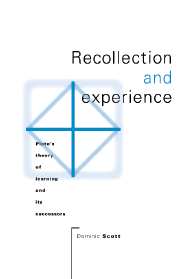Book contents
- Frontmatter
- Contents
- Acknowledgements
- Abbreviations
- GENERAL INTRODUCTION
- SECTION I PLATONIC RECOLLECTION
- SECTION II ARISTOTELIAN EXPERIENCE
- SECTION III HELLENISTIC CONCEPTS
- SECTION IV INNATISM IN THE SEVENTEENTH CENTURY
- Introduction
- 9 The inner core and mortar of our thoughts
- 10 Locke and the posture of blind credulity
- CONCLUSION
- Bibliography
- Index of ancient passages
- General index
9 - The inner core and mortar of our thoughts
Published online by Cambridge University Press: 03 December 2009
- Frontmatter
- Contents
- Acknowledgements
- Abbreviations
- GENERAL INTRODUCTION
- SECTION I PLATONIC RECOLLECTION
- SECTION II ARISTOTELIAN EXPERIENCE
- SECTION III HELLENISTIC CONCEPTS
- SECTION IV INNATISM IN THE SEVENTEENTH CENTURY
- Introduction
- 9 The inner core and mortar of our thoughts
- 10 Locke and the posture of blind credulity
- CONCLUSION
- Bibliography
- Index of ancient passages
- General index
Summary
METAPHYSICAL INNATISM
The best known philosophers to argue for the innateness of metaphysical ideas in the seventeenth century were Descartes, Leibniz and, among the Cambridge Platonists, More and Cudworth. All of them were familiar with Plato's theory of recollection and acknowledge as much explicitly. Sometimes their references are made in a spirit of congratulation, but More, Cudworth and Leibniz are also at pains to register what they see as the essential difference between Plato and themselves, the acceptance or rejection of the literal theory of recollection. What is at issue in this chapter, however, is the further difference about which they are silent, namely that, unlike Plato, they expected a theory of innateness to explain mundane concept formation.
When we discussed Descartes's dispositionalist variety of innatism in chapter 3, we referred to his Notes directed at a certain Programme. This was in fact a series of replies to some criticisms of his Meditations made by an erstwhile follower, Regius, and it had been in the third Meditation that Descartes had espoused the innateness of ideas, thus provoking his opponent's empiricist reply. The Notes act as a useful commentary on the third Meditation.
Here he is in Meditation III announcing a threefold division of our ideas:
But among these ideas, some appear to me to be innate, some adventitious, and others to be formed [or invented] by myself; for, as I have the power of understanding what is called a thing, or a truth, or a thought, it appears to me that I hold this power from no other source than my own nature.
- Type
- Chapter
- Information
- Recollection and ExperiencePlato's Theory of Learning and its Successors, pp. 225 - 239Publisher: Cambridge University PressPrint publication year: 1995



